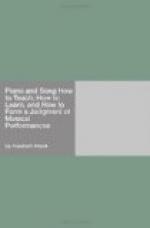I will now consider the use of loose and independent fingers, in playing generally; i.e., in that of more advanced pupils who have already acquired the necessary elementary knowledge. The fingers must be set upon the keys with a certain decision, firmness, quickness, and vigor, and must obtain a command over the key-board; otherwise, the result is only a tame, colorless, uncertain, immature style of playing, in which no fine portamento, no poignant staccato, or sprightly accentuation can be produced. Every thoughtful teacher, striving for the best result, must, however, take care that this shall only be acquired gradually, and must teach it with a constant regard to individual peculiarities, and not at the expense of beauty of performance, and of a tender, agreeable touch.
* * * * *
It is a mortifying fact for many critics, artists, composers, and teachers, that the general public show much more correct judgment and appreciation of a fine, noble piano performance, and of a simple, pure, well-taught style of singing, and also understand the characteristics of the performer, much more quickly than they do. The sensibility and appreciation of beauty with the public is less prejudiced, less spurious, more receptive, and more artless. Its perceptions are not disturbed by theories, by a desire to criticise, and many other secondary matters. The public do not take a biassed or stilted view. The admiration for Jenny Lind is a striking proof of this, as is also the appreciation of many piano-players.
* * * * *
The age of progress announces, in piano-playing also, “a higher beauty” than has hitherto existed. Now, I demand of all the defenders of this new style, wherein is this superior beauty supposed to consist? It is useless to talk, in a vague way, about a beauty which no one can explain. I have listened to the playing—no, the thrumming and stamping—of many of these champions of the modern style of beauty; and I have come to the conclusion, according to my way of reasoning, that it ought to be called a higher,—quite different, inverted beauty,—a deformed beauty, repugnant to the sensibilities of all mankind. But our gifted “age of the future” protests against such cold conservatism. The period of piano fury which I have lived to see, and which I have just described, was the introduction to this new essay, only a feeble attempt, and a preliminary to this piano future. Should this senseless raging and storming upon the piano, where not one idea can be intelligently expressed in a half-hour, this abhorrent and rude treatment of a grand concert piano, combined with frightful misuse of both pedals, which puts the hearer into agonies of horror and spasms of terror, ever be regarded as any thing but a return to barbarism, devoid of feeling and reason? This is to be called music! music of the future! the beauty of the future style!




